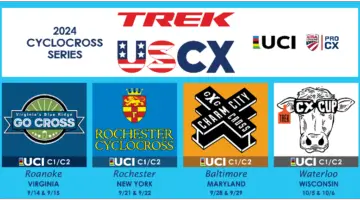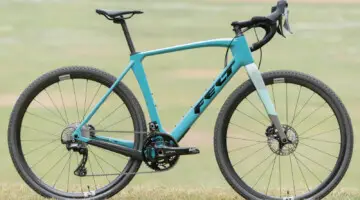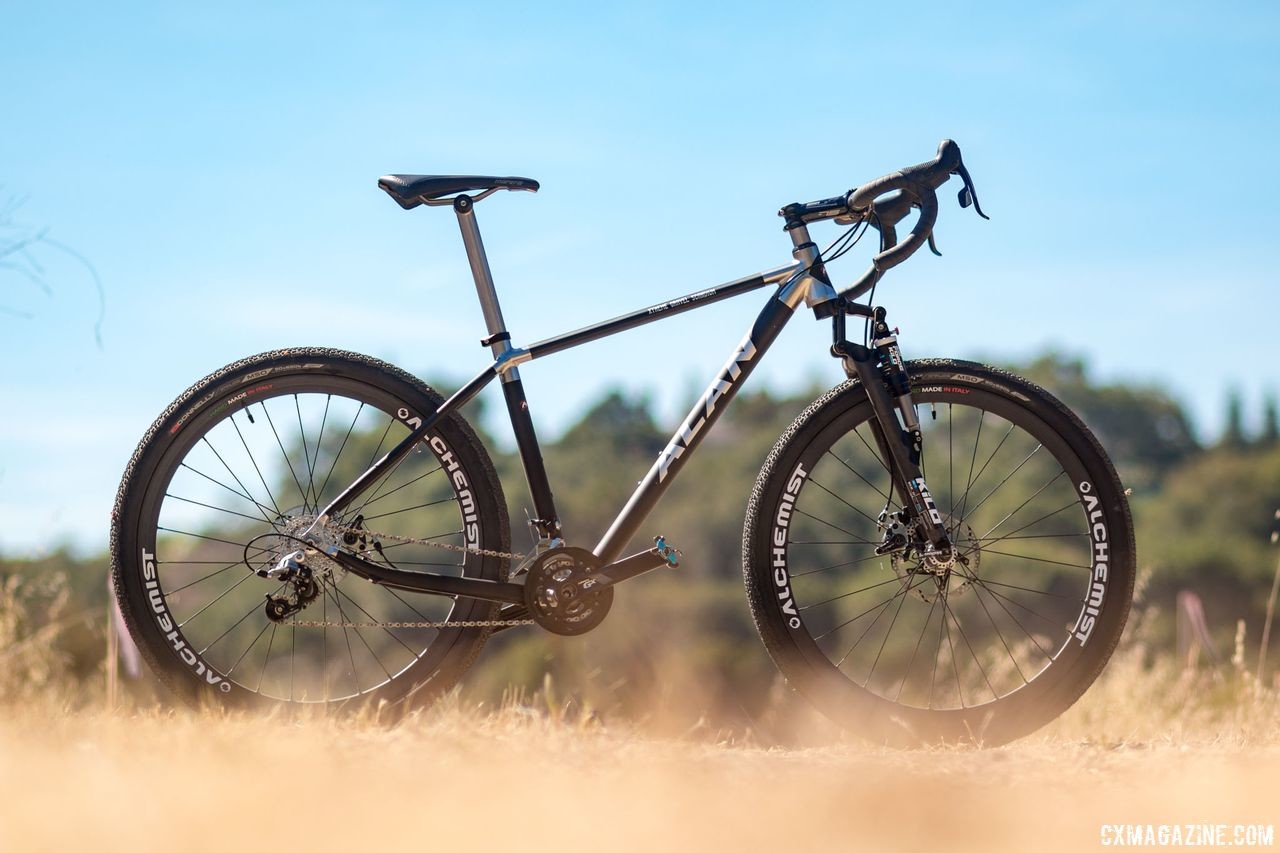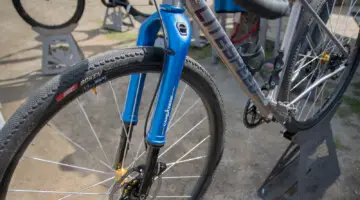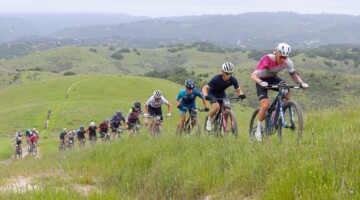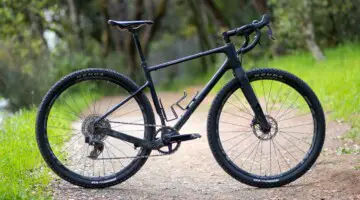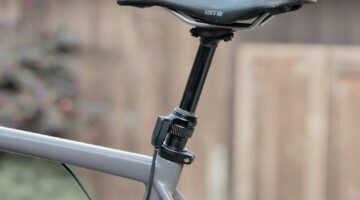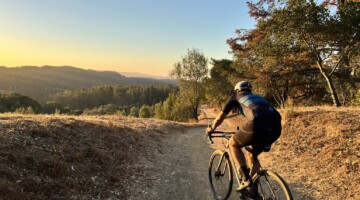Alan is no stranger to off-road drop bar machines, as it could be considered one of the most storied names in cyclocross. We’ve gushed about the company’s Super Cross Carbon cyclocross bike, with a finish that gives a nod to the company’s glued-and-screwed era.
Many of those original frames have survived over the years, helping carry cycling legends like Giro racer George Mount through the rough Lost and Found gravel race, and Don Myrah to his cyclocross comeback after a few decades of retirement. Even in 2018, the decades-old frames are still winning Nationals titles.
With gravel seemingly here to stay, Alan has now moved into the gravel market as well.
Gravel seems both popular and mature enough to be divided up into sub-disciplines. We’ve got partial gravel (or mixed terrain), normal gravel and now, thanks to Italian bike builder, we have Xtreme Gravel.
Whether you like the model name or not, Italy’s Alan Bike and U.S.-based Velosport Imports have taken an extreme approach to their embrace of the gravel movement, and have a slew of frameset options that target the popular, arguably American-centric trendy discipline. Whether you want carbon, aluminum or scandium, a front suspension or rigid fork, or 700c or 650b wheels, Alan has a frameset ready to help you build your dream gravel bike.
One of Alan’s gravel offerings is the alloy Alan Xtreme Gravel Scandium. The Italian company sent Cyclocross Magazine the Xtreme Gravel Scandium for review, and it’s been one of our steeds of choice for recent mixed terrain rides. We take a first look at the customizable gravel bike for this In Review Spotlight. Stay tuned for a full review.
The Xtreme Gravel Frame
Capable yet practical bikes are not built purely based on pedigrees, but rather on how real-world cyclists ride and race. The Xtreme Gravel takes a more modern approach, forgoing narrow diameter flexy aluminum tubes and lugs for large diameter TIG welded scandium alloy tubes, a compact frameset with sloping top tube and low bottom bracket and of course, disc brakes.
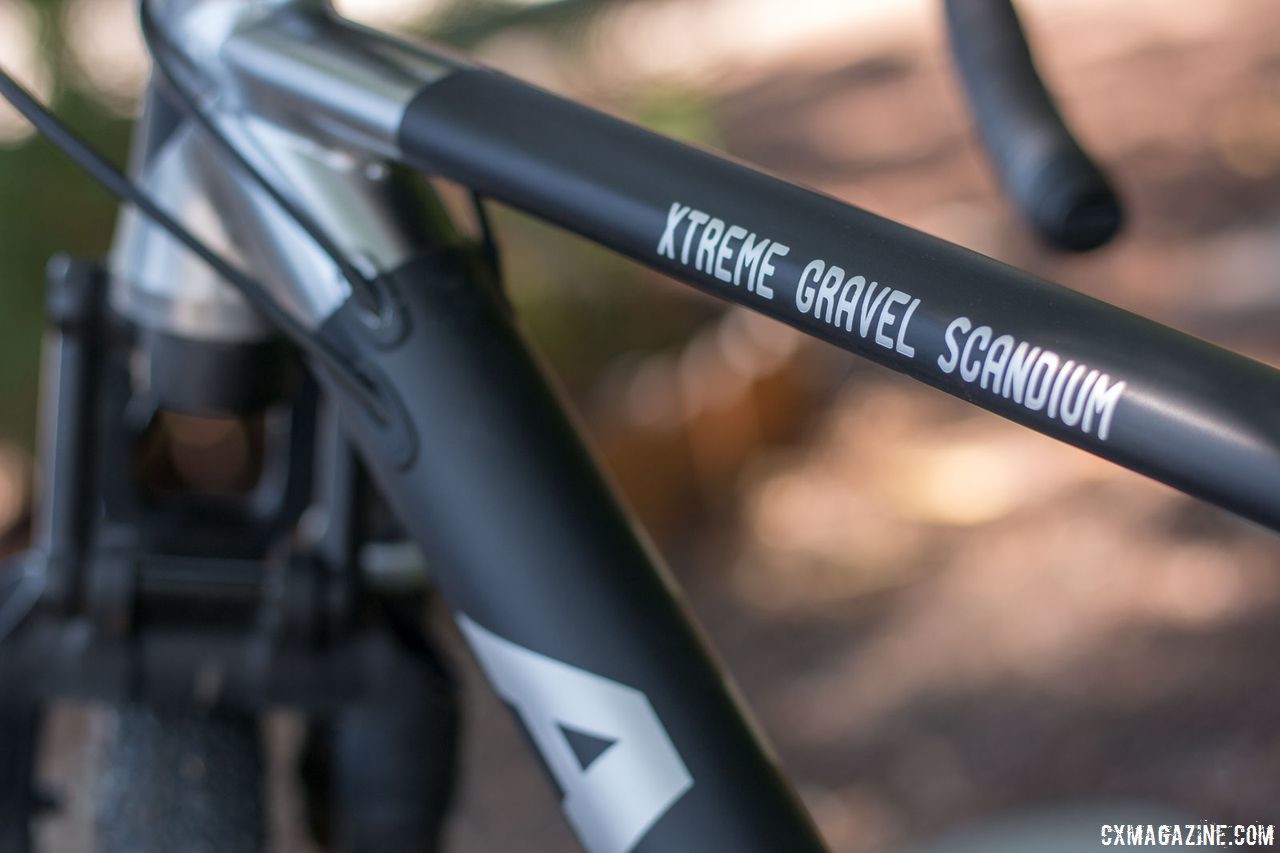
Alan allows the design of its scandium alloy frame to be customized based on your needs. Alan Xtreme Gravel Scandium with Kilo fork and Alchemist wheels. © Cyclocross Magazine
Any Cyclocross Magazine review would be incomplete without geometry details here, and some will find our test bike’s frame to be ideal.
Alan offers this model in five stock sizes, but the unique selling point about this Italian maker is that custom geometry on this scandium frame is available at no extra charge. Know what you want? You can request it, and the Italians will build it.
Don’t know what you want but know the stock geo won’t fit your unique body? Take some key measurements, send them to Velosport Imports, and John Siegrist and his team will draw up a frame for you to approve. At $1,700, Alan is competitive with other custom options from big and small builders.
Our test model was built specifically with a suspension fork in mind and leans long and low. Our 57cm test bike featured a 57cm effective top tube, with the actual top tube featuring a dramatic slope down to a short 46cm seat tube. Long 44.75cm chainstays offer gobs of tire clearance out back.
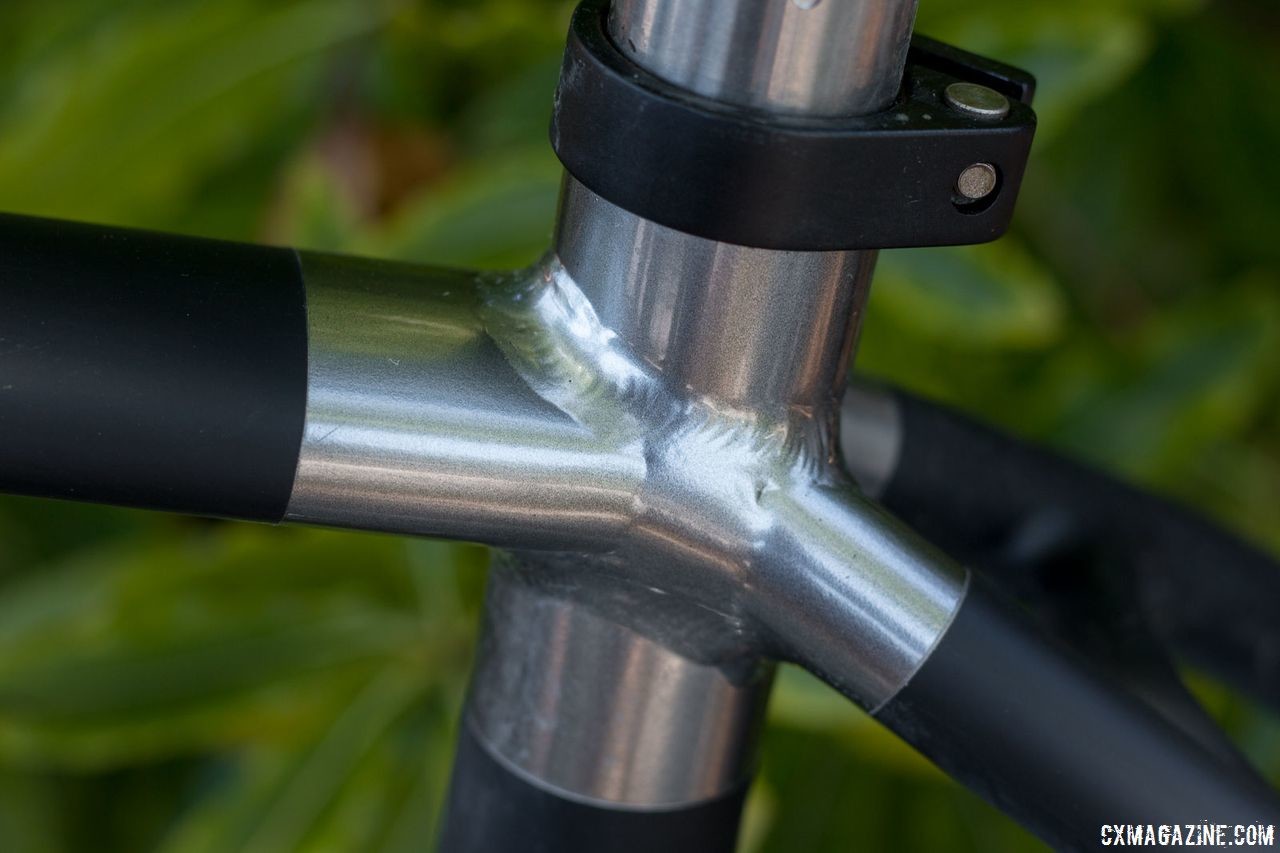
It’s not your dad’s glued and screwed Alan, but the paint scheme might have you thinking it was a bonded, lugged frame, at least from a distance until you see the welds. Alan Xtreme Gravel Scandium with Kilo fork and Alchemist wheels. © Cyclocross Magazine
When paired with the unique Kilo suspension fork (more on that later), it sits without sag at a low 7.6cm bottom bracket drop. That’s a far cry from your dad’s sky-high Alan cyclocross bike.
Geometry nerds may want to know the tubes form a 71. 5-degree head angle and 73.5-degree seat angle. Alan doesn’t have reach or stack numbers, and we didn’t measure them yet.
It’s easy to nitpick about specific aspects of our test Xtreme Gravel Scandium, but it’s also just as easy to refute most of them with the fact that custom geometry is available at no extra charge. Want shorter chainstays? Alan says, “No problem.”
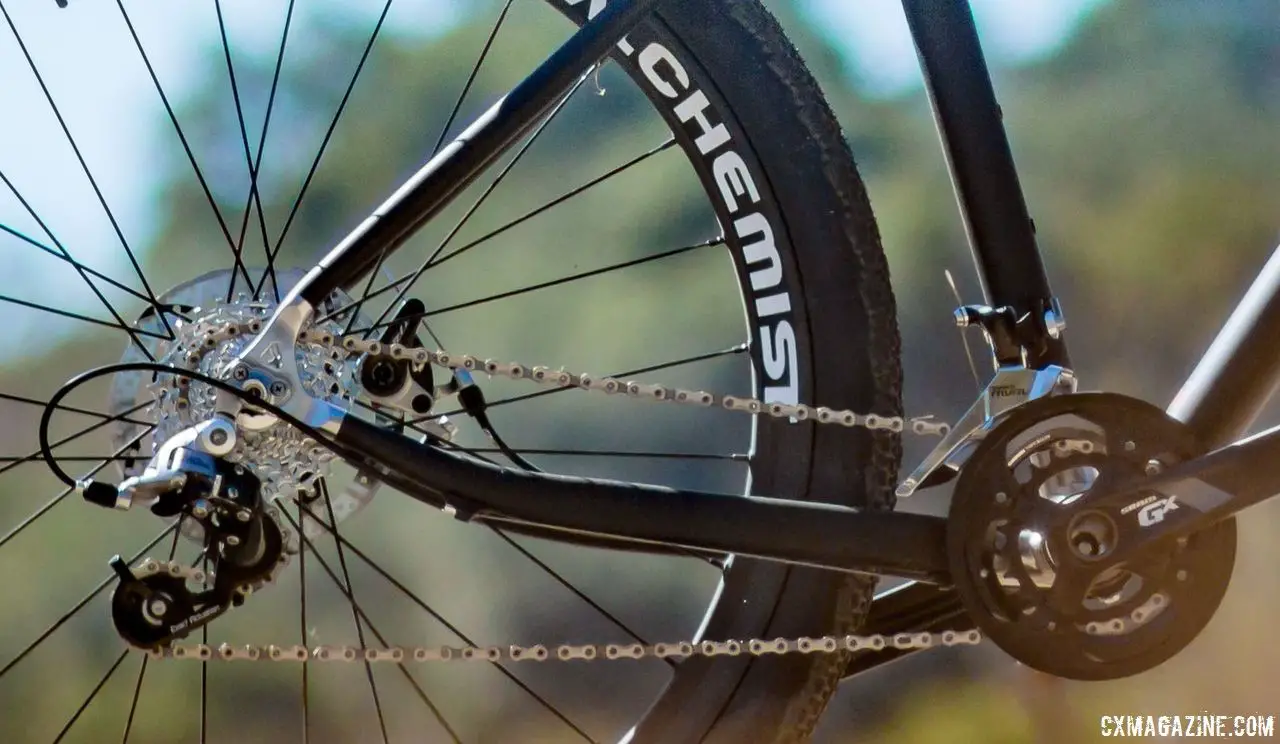
The Xtreme Gravel has a BB drop of 7.6cm, leaving it pretty low. Alan Xtreme Gravel Scandium with Kilo fork and Alchemist wheels. © Cyclocross Magazine
The Xtreme Build
One look at the photos of our test bike is likely to elicit strong reactions from many observers. Old-timers might make a comment about AMP forks or Tomac or Phelan, but this was not built up to mimic those builds or conjure up memories, good or bad, of bygone eras.
Velosport Imports simply built up a gravel bike for adventure, while showcasing some of the products they import and carry.
Most notable is the Kilo #1 fork made by German A. The fork does look similar to the AMP forks of the 1990s, but it replaces alloy legs with carbon, eschews cantis for disc brakes, uses sealed bearings over bushings and relies on a highly adjustable air shock called the Air Force Kilo. The fork has an optional lockout, but ours did not come with one.
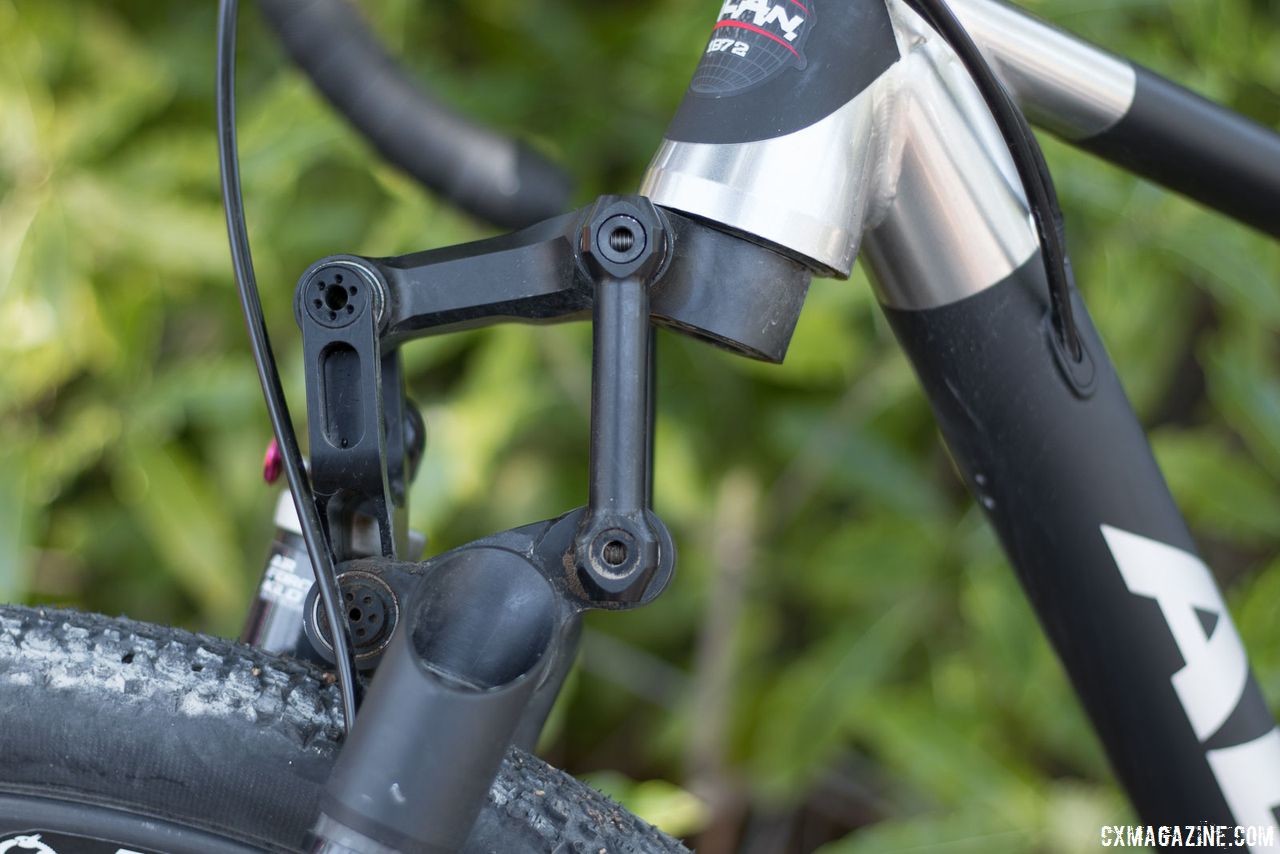
German A calls it a trapezoid, but regardless of the shape, the Kilo #1 fork boasts 90mm of travel and weighs just 1,200g. Alan Xtreme Gravel Scandium with Kilo fork and Alchemist wheels. © Cyclocross Magazine
Our fork boasts 90mm of travel—which is much more than the constrained travel seen in gravel offerings from Fox, Cannondale and MRP—and yet it tips the scales at just 1200g, or about 2.65 pounds list weight.
While it’s not a 1990s Amp Fork, it still is retro in some aspects. Our fork relied on quick release front axles and post mount disc brakes.
Ready to put down $1,450 for such a fork? Cyclists looking for something unique and wanting a Kilo now will unfortunately be disappointed to learn that the fork featured on our bike isn’t currently available. The manufacturer is currently redesigning the fork, likely to incorporate thru-axle and flat mount brake mounts.
The Alchemist XC-1 PRO 650b / 27.5″ wheels are also unique and eye-catching. The carbon hubs and rims feature unique shapes and although relatively deep at 33mm, aren’t your typical bullet-shaped aero profile. These tubeless-compatible carbon rims are built with cross-country mountain biking abuse in mind and hopefully, also gravel grinding.
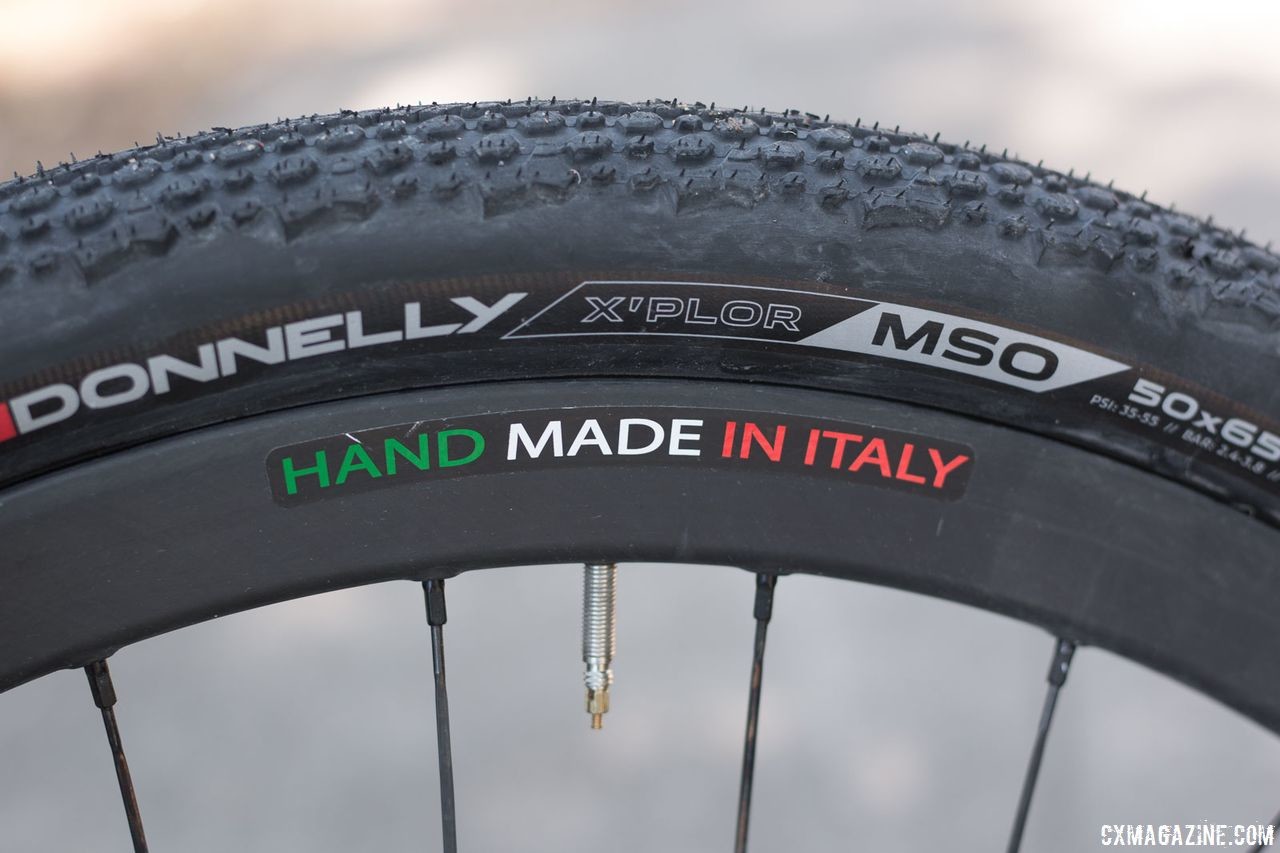
Our test bike came with carbon Alchemist rims and 50mm Donnelly X’Plor MSO tires that encouraged us to get rowdy. Alan Xtreme Gravel Scandium with Kilo fork and Alchemist wheels. © Cyclocross Magazine
We’ve reviewed Alchemist wheels in the past and found them to be one of the tightest tire-fitting rims. They resisted burps and could convert non-tubeless tires, but the tightest tires like the WTB Cross Boss would not fit. They were one of the lightest carbon tubeless wheelsets we’ve tested at the time (although the new NoTubes Grail CR7 has that claim now). Still, at 1,310g list weight, the Alchemist wheels are weight weenie pleasers and feel much stiffer than the Grail CR7.
Our wheels were dressed with Donnelly X’Plor MSO 650b 50mm rubber. The high-volume tires beg for adventure and grip well until conditions get very loose.
The crankset also isn’t your standard gravel fare. The SRAM GX double crankset with 36/24t chain rings and built-in outer chain guard looks small—and may be too low to chase your local group road ride—but paired with a puny-looking 11-28t rear cassette, offers a lower gear than a 38×42 single chain ring setup and has smaller jumps.
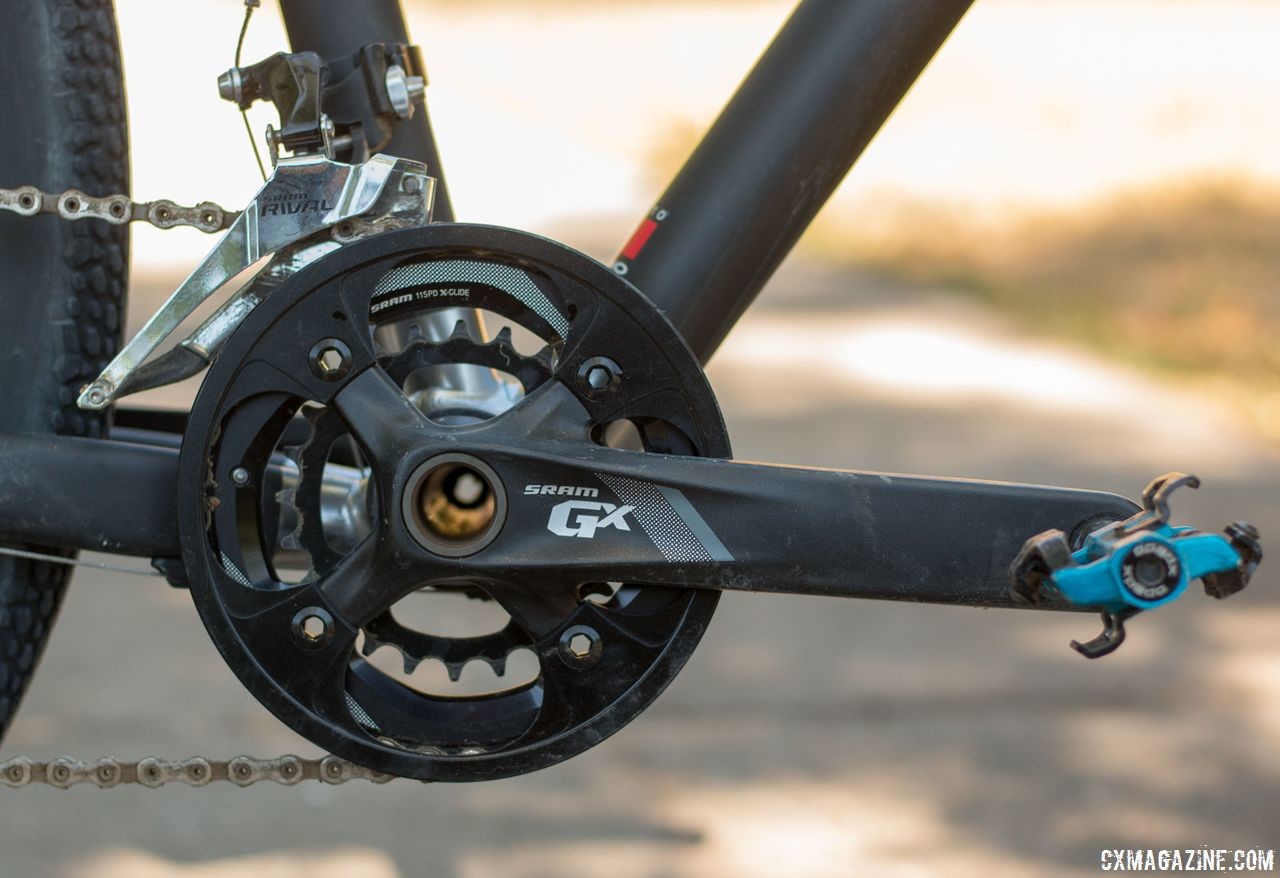
The SRAM GX crankset has 36/24t chain rings to help with extreme terrain. Alan Xtreme Gravel Scandium with Kilo fork and Alchemist wheels. © Cyclocross Magazine
The rest of the build opts for more common gravel bike componentry. A pair of SRAM Rival 22 derailleurs and DoubleTap shifters paired with TRP Spyre SLC mechanical disc brakes handle shifting and braking, while an FSA Adventure alloy handlebar and SL-K stem offer some flare for the rider’s perch.
A handsome no-name zero setback one-bolt titanium seat post holds a Selle San Marco Mantra saddle.
As received, with inner tubes, the bike weighed 21.9 pounds. The Cyclocross Magazine weight without wheels, for those of you with race wheels awaiting, is 14.0 pounds.
The Ride
We often say the best way to test a bike is to ride it blind, without studying its geometry or reading manufacturer descriptions, and in this case, we couldn’t help but follow this philosophy. Our test bike featured custom geometry and an unfamiliar fork and drivetrain mix. So we hopped on the bike without any sense of the numbers and set off to our local dirt and gravel paths, without any preconceived notions other than from the name “Xtreme.”
First impressions revealed a low, stable and smooth ride. It’s a far cry from a Euro ’cross bike, in that it trades off-camber proficiency for excelling at long, sweeping descents and rutted roads. The bike as configured, even with inner tubes, helped set a PR on a four-minute pedaling-filled downhill segment.
The long, low configuration is at home riding gravel and dirt roads, and thanks in part to the suspension fork and fat 50mm tires, the Alan Xtreme Gravel eats up bumpy singletrack as well. Where it falters a bit is in hairpin turns and rocky, rooty terrain—you might notice this a bit on a technical cyclocross course in the form of pedal strikes, we certainly did, especially with the 175mm cranks—but you might make up for it when it gets really bumpy.
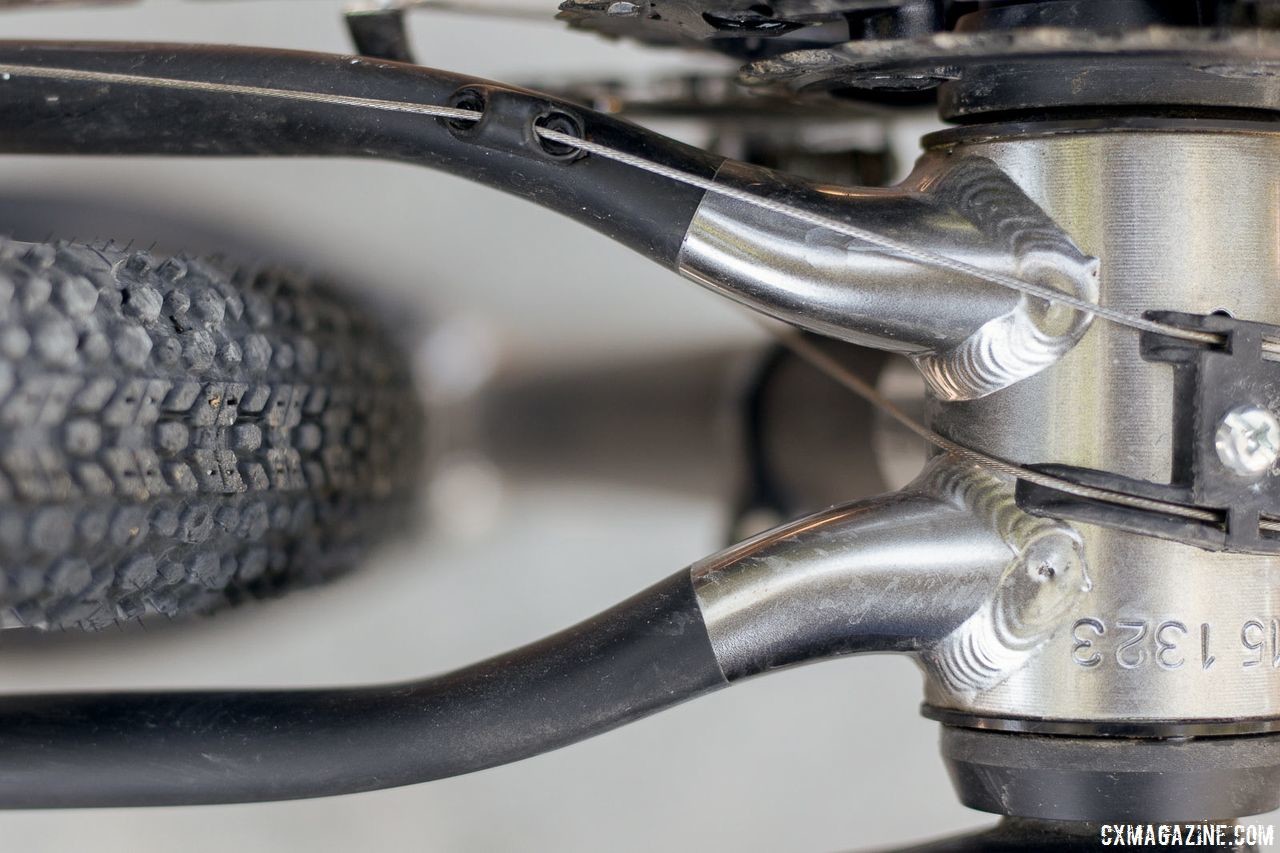
Out back, our frame had clearance for mountain bike 27.5 tires or 700x40mm gravel rubber. Alan Xtreme Gravel Scandium with Kilo fork and Alchemist wheels. © Cyclocross Magazine
Thankfully, most gravel rides and races don’t feature hairpins or roots. And while we have to review and comment on the bike we received, should you decide you want more of an all-around machine, Alan is ready to custom build a gravel frame to your exact geometry needs.
As for the fork? The fork’s compression and rebound are easily adjustable. Dial in the stiffness through air pressure and use a simple dial to adjust the rebound speed. The spring rate feels quite linear—you’d either optimize for small bump sensitivity or big bump absorption.
When we set the Kilo fork to maximum plushness, we craved the optional lockout, as out-of-the-saddle efforts had a bit too much bounce. On our test fork, there was plenty of clearance for 50mm 650b rubber, but a 700c x 40mm tire wouldn’t fit, even though out back in the frame there’s room for that and more.
It’s worth noting that the fork is also best tested blind. The near-parallelogram nature of the fork means for every millimeter of vertical movement, at the crown of the fork, the visible linkage at the crown moves backward. It plays tricks on your eyes, as it looks like the fork is moving a lot for every surface imperfection, but yet it doesn’t feel quite as sensitive at the bars. It’s all relative to a normal telescoping fork though, as you don’t see every bit of movement on such forks when they’re moving.
All said, the Kilo is an interesting lightweight option that provides more useful travel than the dedicated-gravel offerings we’ve seen, and we’re excited to see an updated version that hopefully features modern thru-axle dropouts and a lockout.
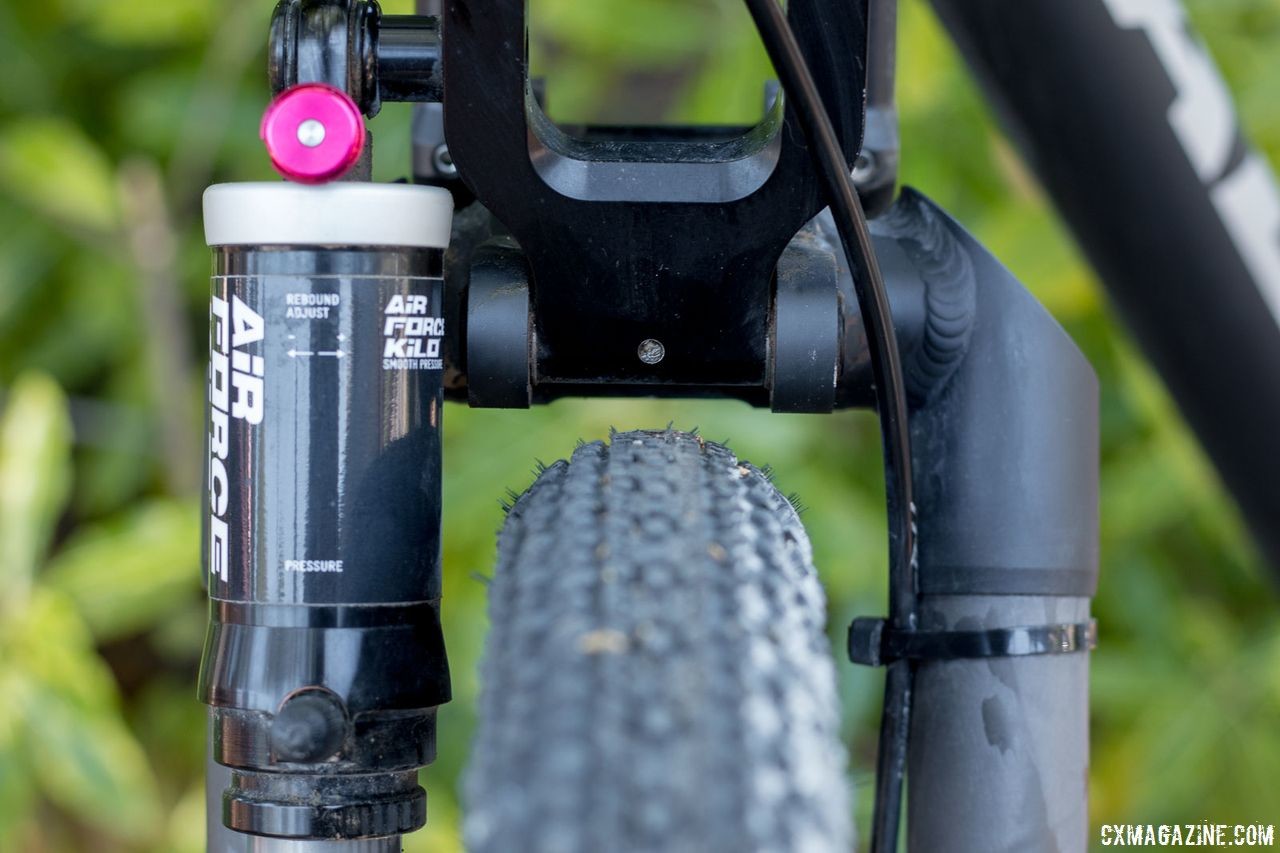
The Alan Xtreme Gravel Scandium was suspended by the German A Kilo #1 fork. It was easily adjustable, light, but could have used more tire clearance in case you wanted to run 700×40 rubber. © Cyclocross Magazine
It doesn’t feel quite fair to pick on a bike because of its name, but with a name like Xtreme Gravel, we can’t help but long for hydraulic braking power for more extreme descents. The dual-piston Spyre SLC mechanical disc brakes are adjustable and feature TRP’s new pad covers to keep the braking area cleaner, but left us longing for more modulation and power when it got steep.
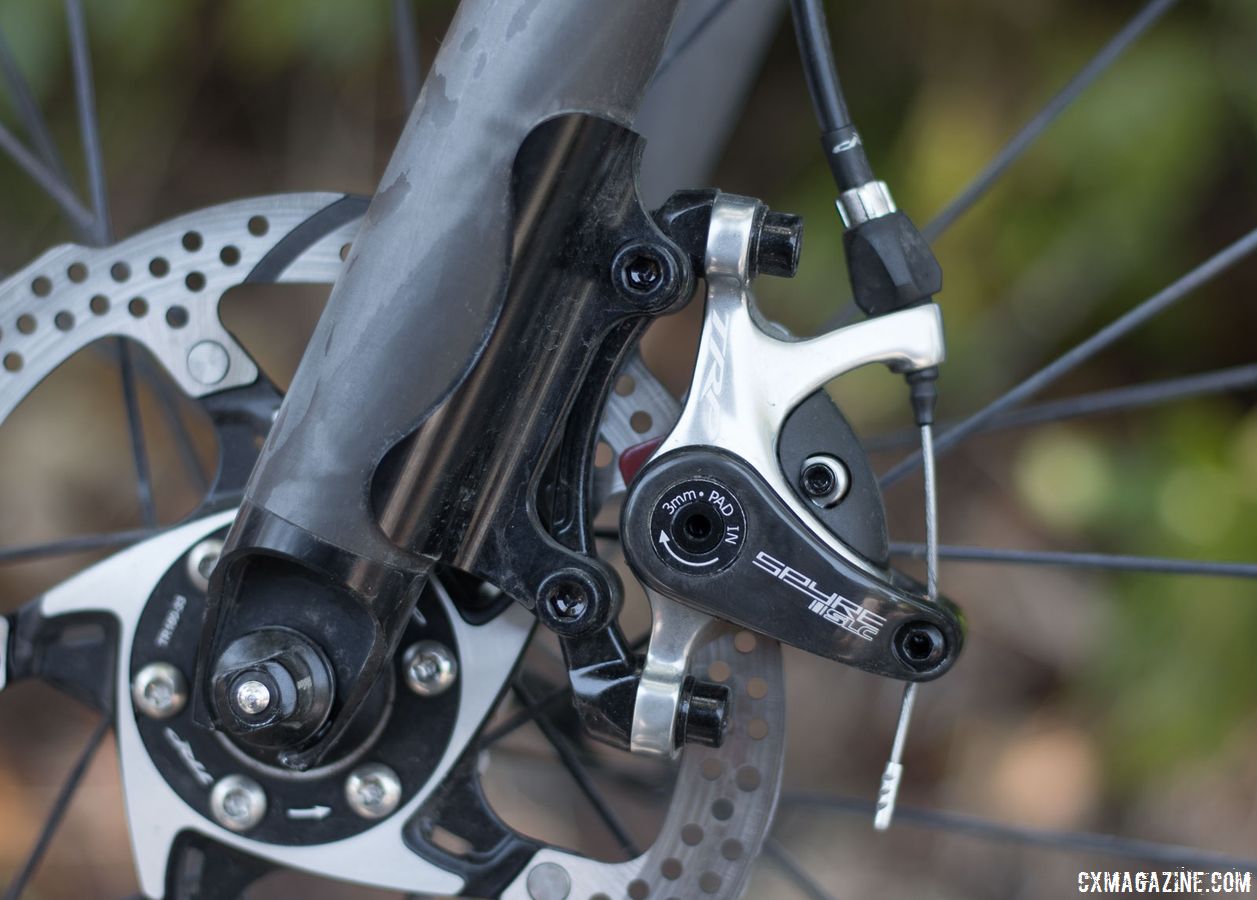
QR and IS/Post Mount brakes are surprising on a gravel bike, but German A is reworking the Kilo fork, and we’re guessing it’ll get thru axles and flat mount. The TRP Spyre SLC mechanical disc brakes did not quite live up to the Xtreme braking needs. Alan Xtreme Gravel Scandium with Kilo fork and Alchemist wheels. © Cyclocross Magazine
As for the ride quality of the frame, it’s plenty stiff. The welded scandium tubes and compact frame configuration make for a ride that’s nothing close to the lugged alloy frame the paint job mimics. The long titanium post offers a bit of flex, but it’s up for the task of extreme terrain and efforts, without flexing under such pressure.
The Verdict
It’s hard to criticize a bike and build coming from a builder and retailer that offers custom everything. Custom geo? Alan says yes. Custom spec? Velosport Imports says yes. While this configuration and build are quirky and unique, they highlight the capability of the partner companies to build the bike of your dreams. While we would prefer tighter geometry and full 700c wheel capability (and hydraulic brakes) for some monster crossin’ and more cyclocross racing versatility in our dream build, we sure found this test bike to be fun.
We turned heads, set PRs, climbed steep hills and spun out chasing roadies on the Alan Xtreme Gravel Scandium, and we’re just getting started. We’re anxious to put the bike to the test in some upcoming gravel events, and won’t be surprised if it’s our weapon of choice for some early season, rock-hard cyclocross races. Stay tuned.
For more on the Alan Xtreme Gravel Scandium, see the specs and photo gallery below.
Alan Xtreme Gravel Scandium Specifications
MSRP: $1700 frame only including custom geometry, $1450 fork, $5500 as built
Frame: Alan Xtreme Gravel Scandium, 12mm thru-axle, flat mount disc
Fork: German A Kilo #1 suspension fork, 90mm travel, post mount disc, quick release
Shift/Brake Levers: SRAM Rival DoubleTap
Brake Calipers: TRP Spyre, mechanical disc
Front Derailleur: SRAM Rival 22
Rear Derailleur: SRAM Rival 22
Crankset: SRAM GX, 36/24t chain rings
Cassette: SRAM, 11-28t
Chain: SRAM
Stem: FSA SL-K, alloy
Handlebar: FSA Adventure, alloy, flared
Saddle: Selle Italia San Marco Mantra
Seatpost: Unbranded titanium
Wheels: Alchemist XC-1 PRO 650b / 27.5″, carbon
Tires: Donnelly X’Plor MSO, 650b x 50mm
More Info: alanbike.it
Photo Gallery: Alan Xtreme Gravel Scandium










